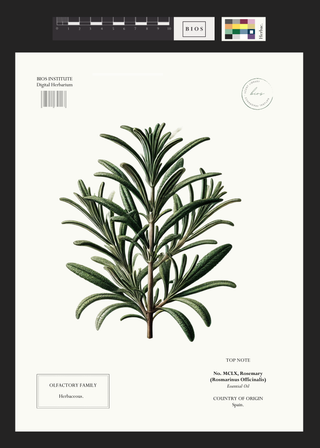

Rosmarinus officinalis, commonly known as rosemary, is native to the Mediterranean region. Its natural range includes countries in southern Europe, such as Spain, Portugal, Italy, Greece, and parts of North Africa, including Morocco and Tunisia. Ours is sourced from Spain.
Rosemary is well-adapted to the Mediterranean climate, where it thrives in sunny and dry conditions with well-drained soil. It is a hardy and drought-resistant evergreen shrub with aromatic needle-like leaves and small blue or purple flowers.
Rosemary has a distinct, herbaceous fragrance with a refreshing and uplifting quality. Its aroma is characterized by notes of pine, camphor, and a hint of floral sweetness. The scent of rosemary is often described as energizing, invigorating, and reminiscent of the outdoors.
Its aromatic profile adds a green, herbaceous, and slightly woody note to fragrances, providing depth and complexity. Rosemary is a Top Note found in our Herbaceous family. It is particularly utilized in fresh, herbal, or citrus-based compositions.
Rosemary is not only used in perfumery but also in culinary traditions. Its leaves are commonly used as a seasoning in cooking due to their aromatic flavor. The connection between rosemary's culinary and aromatic qualities can also be explored in perfumery compositions, creating unique and evocative scent profiles.
Overall, rosemary is a versatile and valued ingredient in perfumery, offering its distinctive fragrance and therapeutic benefits. Its cultural significance, historical use, and culinary associations add depth to its presence in the world of perfumes.
Rosemary is commonly associated with remembrance and is often used in memorial ceremonies and rituals. In many cultures, it is believed that the scent of rosemary can enhance memory and help evoke memories of loved ones. In some countries, such as the United Kingdom, rosemary sprigs are worn or placed on war memorials as a symbol of remembrance for fallen soldiers.
Rosemary has been used for centuries as a protective herb. In folklore, it was believed that hanging rosemary branches or sprigs in doorways or carrying them offered protection against evil spirits and negative energies. It was also used to purify and cleanse spaces, such as homes and temples.
Rosemary has been associated with love and fidelity in certain cultural traditions. In ancient Greece and Rome, it was considered a symbol of love and used in wedding ceremonies. Brides often wore rosemary wreaths or carried bouquets that included rosemary to symbolize fidelity and loyalty.
In some cultures, rosemary is believed to bring good luck and blessings. It is thought to attract positive energy and ward off negativity. Rosemary branches were sometimes placed in homes or carried for good luck, prosperity, and protection.
Rosemary has been used in culinary and medicinal practices for centuries. Its aromatic flavor and health benefits have made it a popular herb in cooking and natural remedies. The culinary use of rosemary is often associated with the enhancement of flavor and the promotion of good health.
Rosemary has been surrounded by various folklore and superstitions. In some cultures, it was believed that planting rosemary near the entrance of a home brought blessings and protection. Additionally, it was thought that if a young woman placed rosemary under her pillow, she would dream of her future spouse.
Rosemary
- Unit price
- /per
Please note this product format is a small vial that contains roughly 20 drops of scent concentrate. This can be purchased à la carte but is intended to be used with our Perfume Kit.
SCENT SPECIFICATIONS
Latin Name: Rosmarinus Officinalis
Extraction Method: Steam Distilled
Country of Origin: Spain
All of the scents in our library are naturally derived - our collection includes essential oils, absolutes, concretes, isolates, enfleurage, macerations, oleoresins, and mixed medium naturals.
Adding product to your cart
Rosmarinus officinalis, commonly known as rosemary, is native to the Mediterranean region. Its natural range includes countries in southern Europe, such as Spain, Portugal, Italy, Greece, and parts of North Africa, including Morocco and Tunisia. Ours is sourced from Spain.
Rosemary is well-adapted to the Mediterranean climate, where it thrives in sunny and dry conditions with well-drained soil. It is a hardy and drought-resistant evergreen shrub with aromatic needle-like leaves and small blue or purple flowers.
Rosemary has a distinct, herbaceous fragrance with a refreshing and uplifting quality. Its aroma is characterized by notes of pine, camphor, and a hint of floral sweetness. The scent of rosemary is often described as energizing, invigorating, and reminiscent of the outdoors.
Its aromatic profile adds a green, herbaceous, and slightly woody note to fragrances, providing depth and complexity. Rosemary is a Top Note found in our Herbaceous family. It is particularly utilized in fresh, herbal, or citrus-based compositions.
Rosemary is not only used in perfumery but also in culinary traditions. Its leaves are commonly used as a seasoning in cooking due to their aromatic flavor. The connection between rosemary's culinary and aromatic qualities can also be explored in perfumery compositions, creating unique and evocative scent profiles.
Overall, rosemary is a versatile and valued ingredient in perfumery, offering its distinctive fragrance and therapeutic benefits. Its cultural significance, historical use, and culinary associations add depth to its presence in the world of perfumes.
Rosemary is commonly associated with remembrance and is often used in memorial ceremonies and rituals. In many cultures, it is believed that the scent of rosemary can enhance memory and help evoke memories of loved ones. In some countries, such as the United Kingdom, rosemary sprigs are worn or placed on war memorials as a symbol of remembrance for fallen soldiers.
Rosemary has been used for centuries as a protective herb. In folklore, it was believed that hanging rosemary branches or sprigs in doorways or carrying them offered protection against evil spirits and negative energies. It was also used to purify and cleanse spaces, such as homes and temples.
Rosemary has been associated with love and fidelity in certain cultural traditions. In ancient Greece and Rome, it was considered a symbol of love and used in wedding ceremonies. Brides often wore rosemary wreaths or carried bouquets that included rosemary to symbolize fidelity and loyalty.
In some cultures, rosemary is believed to bring good luck and blessings. It is thought to attract positive energy and ward off negativity. Rosemary branches were sometimes placed in homes or carried for good luck, prosperity, and protection.
Rosemary has been used in culinary and medicinal practices for centuries. Its aromatic flavor and health benefits have made it a popular herb in cooking and natural remedies. The culinary use of rosemary is often associated with the enhancement of flavor and the promotion of good health.
Rosemary has been surrounded by various folklore and superstitions. In some cultures, it was believed that planting rosemary near the entrance of a home brought blessings and protection. Additionally, it was thought that if a young woman placed rosemary under her pillow, she would dream of her future spouse.
